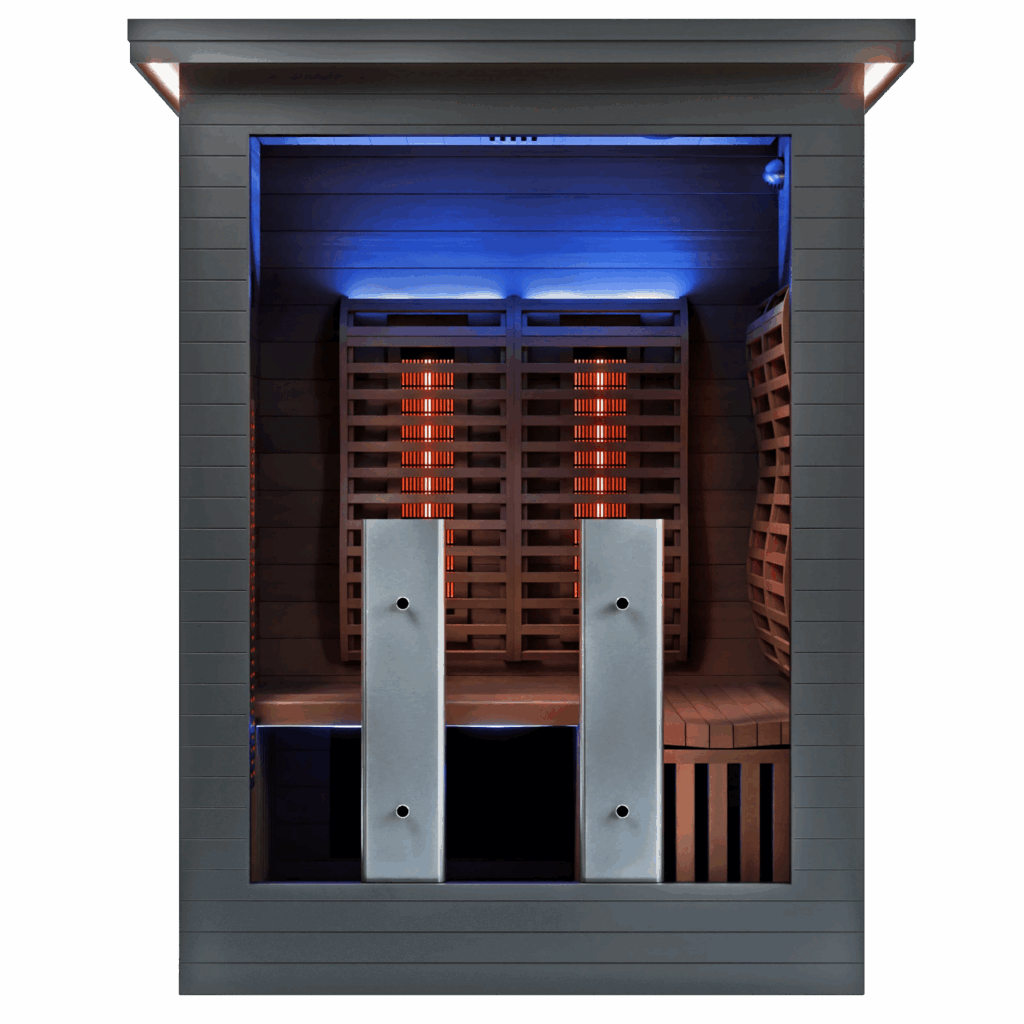
Good sleep is important for mental health. Stress and anxiety often lead to poor sleep. But poor sleep makes the stress even worse. It becomes a cycle.
Sauna sessions can break this cycle.
After being in a sauna, your body cools down gradually. When it does so, it sends signals to your brain that this is the time to sleep. Many people sleep quicker after a sauna session. Others said they slept deeper.
Better sleep enhances mood, focus, and emotional stability. These eventually lead to a reduction in the levels of stress and anxiety naturally.
Heat Stress and the Body’s Natural Response

Inside the sauna, your system undergoes “heat stress.” The heat stress is soft and controlled. It is non-threatening. Instead, it turns on your body’s natural safety mechanisms.
This process unfolds:
- Your body temperature increases
- Your heart rate quickens
- Blood vessels dilate
- Blood flow improves
- Perspiration begins
This process is representative of mild exercise. Your body is working harder to maintain stability. This body process initiates many benefits to health.
Scientists call this hormesis. Hormesis is mild stress with positive effects. Sauna therapy applies heat as healthy stress. Through this stress, you will be healthier and stronger.
Improved Circulation and Heart Health

Heat increases blood circulation in your body. When your blood vessels dilate, your heart pumps a little harder, which is safe for the vast majority of people — it’s similar to a slow jog or a brisk walk.
Better blood circulation provides more oxygen to your muscles and vital organs, and also aids in the removal of waste products.
The research confirms that if the sauna used is regular, then it supports heart health, lowers blood pressure, improves blood vessel function, and reduces the incidence of cardiovascular disease.
This is why many wellness experts suggest sauna therapy a few times per week – it keeps your circulatory system engaged and healthy.
Sweating and Detoxification

Detoxification is one of the main reasons people visit saunas. However, what exactly does “detox” mean?
Toxins from diet, the environment, and even stress are constantly being accumulated by your body. Your body eliminates these pollutants in a number of ways:
- Liver
- Kidneys
- Skin
- Breath
The most effective way to detox is through sweating. Sweat contains small amounts of heavy metals, chemicals, and pollutants.
The heat from the sauna promotes sweating. The more you sweat, the more you are thereby inducing your body’s natural detoxification and cleansing mechanisms. The reason people feel lighter and cleaner after sauna use is due to sweating.
Studies have shown that sweat from sauna users contains high levels of:
- Lead
- Mercury
- Bisphenol A (BPA)
- Phthalates
- Arsenic
All of which are harmful to your health. The detoxification of these substances is beneficial for your long-term health.
Heat Shock Proteins: Your Body’s Repair Team

Heat shock proteins are one of the more fascinating discoveries in sauna studies. These proteins protect your cells from damage. When your body increases in temperature it releases heat shock proteins. The heat shock proteins have a very straightforward role:
- Repair damaged cells
- Protect healthy cells
- Reduce inflammation.
- Improve cellular function
Heat shock proteins promote longevity. They can slow down biological aging at the cellular level. Heat shock proteins support muscle recovery, brain health, and immune function as well. This is one major reason athletes, biohackers, and wellness professionals are using sauna therapy every day.
Sauna and Immune System Strength

The heat from the sauna supports and enhances your immunity. When the core temperature of your body rises due to external heat, it creates a fever-like environment. Natural fevers help your body fight infections, or at least hold them at bay. When your internal temperature rises, it will potentially:
- Stimulate white blood cells
- Aid the immune response
- Inhibit harmful bacteria
- Strengthen the recovery process
Frequent sauna users typically report getting fewer colds and seasonal illnesses. By using an external heat source or sauna, your immune response has the highest potential of being primed and prepared to fight the oncoming illness or infection.
Reduced Inflammation and Pain Relief

Inflammation is the root of many chronic health problems. It causes pain, stiffness, and fatigue. Heat therapy is known to reduce inflammation.
Here’s how:
- Heat improves blood flow to sore muscles
- Increased circulation reduces stiffness
- Heat shock proteins lower inflammation markers
- Joints become flexible
- Muscles relax
Many people use saunas for relief from:
- Arthritis
- Muscle soreness
- Back pain
- Sports injuries
The warmth relaxes the body, which helps reduce pain naturally.
Brain Health and Mental Wellness

Sauna therapy does more than help your body. It also helps your mind.
Heat increases levels of norepinephrine. This chemical improves focus and attention. Saunas also boost endorphins, which are natural mood enhancers.
Many users report:
- Less stress
- Better mood
- Reduced anxiety
- Improved sleep
Improved circulation helps the brain receive more oxygen and nutrients. This supports mental clarity and cognitive health.
Some studies even show sauna use may reduce the risk of neurodegenerative diseases like dementia and Alzheimer’s.
The Role of Deep Sweating in Skin Health

Sweating cleans the skin from the inside out. When sweat pushes through your pores, it removes dirt, oil, and dead skin cells.
This leads to:
- Smooth skin
- Fewer breakouts
- Reduced pore blockage
- Healthier complexion
Many people notice their skin glowing after a sauna session. This is the result of increased circulation and clean pores.
Why People Prefer Home Saunas Today

With busy lifestyles, many people prefer using a sauna at home. It offers privacy, convenience, and flexibility. You can use it anytime you want. You do not need a spa membership or travel time.
If you are planning to install one, you can explore this helpful modern home sauna guide. It explains the types of saunas, how they work, and how to choose the right one.
Home saunas come in many styles:
- Traditional
- Infrared
- Steam
- Outdoor
- Portable units
Each type offers unique benefits. Choosing the right one depends on your space and health goals.
Which Sauna Is Best for Health?

If you want to compare models or find the best options for your lifestyle, explore the list of top home sauna systems. It covers high-performing units that support detoxing, relaxation, and wellness.
Infrared saunas are popular for detoxing because they heat the body directly. Traditional saunas are great for deep sweating and cardiovascular benefits. Both are excellent for health.
How Often Should You Use a Sauna?

The majority of professionals suggest saunas:
- 3 to 5 times per week
- For 10 to 20 minutes at a time
If you’re a novice, start slow; 5 to 10 minutes is a good starting point. You’ll be able to lead longer sessions once your body adapts.
The key is to be consistent in sauna usage. The more you use the sauna regularly, the greater the benefits will be.
Final Thoughts
Sauna therapy is simple, natural, and scientifically proven. Heat triggers powerful changes inside your body: it improves circulation, bolsters the immune system, helps the body detoxify, reduces inflammation, supports clarity of the mind, and bestows an overall feeling of wellness.
The science is clear. Sauna therapy works, whether you use a spa or install a home unit. Regular sessions can transform your health.
Your journey to better health can begin with a simple session of heat and relaxation.
- 0shares
- Facebook0
- Pinterest0
- Twitter0
- Reddit0


